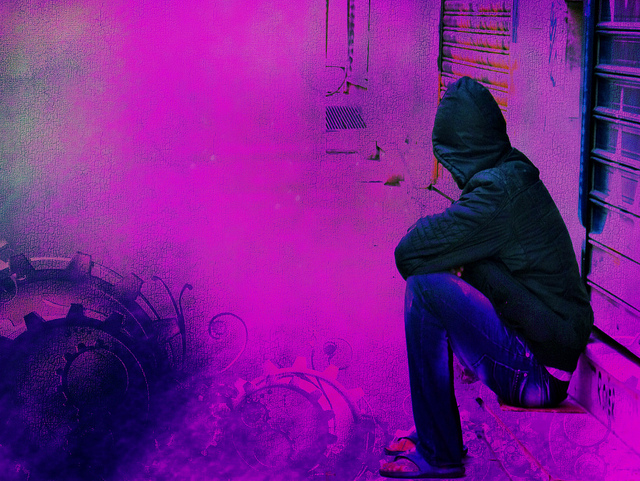
“Please?” I whispered, begging my mother with clasped hands like a character about to be killed on Game of Thrones.
“No,” she said, calmly trying to avoid the dramatic explosion of feelings I tended to produce right around bedtime. “It’s time to go to bed. You just held the baby five minutes ago. You have school in the morning. Good night.”
My face swelled with emotion as I sat, eyes closed, in solemn anguish. “You mean…you mean you’re not… you mean you’re not going to let me hold the baby?!” With Oscar-quality gravitas, I sobbed all the way up the stairs to my bedroom, cursing my mother and praying that I was adopted.
I was three.
This story is a favorite in my family—told and retold at holiday gatherings—because it is ridiculous.
I have always loved playing the victim.
Let me give you an example: at age 22, I entered recovery for drug and alcohol addiction. I am now 26 years old and pursuing an acting career in Los Angeles. I have been sober for three and a half years, I have developed a fulfilling spiritual life and I have nurtured beautiful relationships with people in recovery. I have a job, a place to live, a passion for what I do, and numerous outlets to express that passion. Could my career be going better? Sure. Does life in recovery get hard sometimes? Absolutely. But in the grand scheme of things, I have it pretty good.
But suddenly, my best friend starts booking commercials. And she’s booking a lot of them.
Now, thrown in the light of her success, my success in recovery and the entertainment world and life in general seems paltry, pathetic—a silver ribbon, “try harder next time.” My mind starts coming up with reasons why I’m not booking. “She’s prettier. She’s taller. Some people are just lucky—and you’re not one of them.” And on and on—until I can hear the violins playing on a windy hilltop for the poor, ugly, short, unlucky girl who couldn’t catch a break.
It is a spiral, this victim stuff. Any ripple in the surface of my day can send me into “windy hilltop” territory. Why? Because it’s enticing! When I was little, it made me feel like a Disney princess—it made me feel like someone was going to save me. It may not seem like self-pity can be categorized as “addictive” but I found, three and a half years ago, that once the fog of chemical substances had lifted, I was left grasping for the high I got when I told myself the world was against me.
One day, that same best friend who was booking all those commercials sat me down. I was distraught. I was broke, burned out on my waitressing job(s), and discouraged about acting.
She said something to me that has profoundly changed my life: “Maybe your life isn’t going so well because you’re not very grateful.”
I blanched. Of course I was grateful. I knew I wouldn’t be able to survive without my job. I knew I was lucky I had been born into relative privilege. I was in recovery. I was “spiritual” goddamnit—of course I was grateful!
But she explained to me that gratitude felt good. When someone feels grateful, they feel like they’ve won the jackpot, like they are satisfied, like they can relax. When people feel good, good things start happening to them. And I didn’t feel good, like, ever.
Suddenly, it clicked. I wasn’t grateful.
I knew, intellectually, that I had more than others, but I didn’t feel it in my bones. I didn’t wake up saying, “thank you!” to the universe. More often, I woke up saying, “f*ck you!” So, fueled by the hope of manifesting a better life through gratitude, I started practicing. I found that simply being aware of my tendency towards self-pity propelled me out of it. I read Rhonda Byrne’s The Magic and did the exercises in there.
I started noticing all the stuff I had that other people didn’t. I started smiling at my waitressing job, thanking the Universe even for the bad tips. I started appreciating my apartment, my friends, the food in my fridge—things I really do feel lucky to have, but things I had always overlooked because of how addicted I was to my life being bad.
Slowly, I started to make more money at work. I got an audition just by being really friendly to some guests at my table. Fueled by all the good feelings I was having, and feeling more and more powerful each day, I applied to be a substitute teacher—a job that would allow me to audition and offer more money, while granting me freedom from the service industry. I was becoming committed to my own happiness—the opposite of being a victim.
I am still on the path to becoming a more powerful, more grateful human being. I still play the victim sometimes, but it’s not as exciting anymore—not when compared with the exhilaration of shaping my own life. Maybe I loved being a victim because I thought if it got bad enough someone really would show up and save the day.
These days, I take a deep breath, thank the Universe for this opportunity for trust, and save myself.
Relephant:
Are You a Victim of Victim Mentality?
Author: Samantha Colicchio
Editor: Catherine Monkman
Photo: Sara/Flickr






Read 1 comment and reply